Tamilnadu State Board New Syllabus Samacheer Kalvi 7th English Guide Pdf Play Chapter 1 Jane Eyre Text Book Back Questions and Answers, Summary, Notes.
Tamilnadu Samacheer Kalvi 7th English Solutions Play Chapter 1 Jane Eyre
7th English Guide Jane Eyre Text Book Back Questions and Answers
Warm Up (Text Book Page No. 136)
Every child has a right to an education, a life free from poverty and protection from abuse. (Text Book Page No. 136)
Look at the picture.
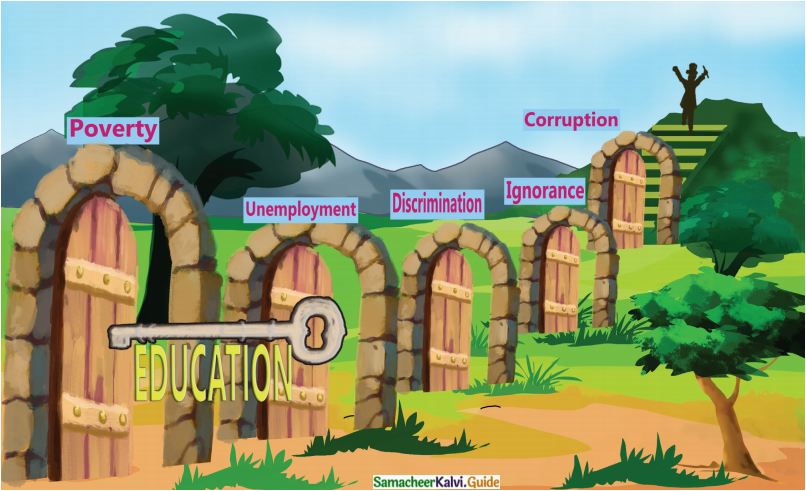
Discuss in pairs and answer:
1. What are the basic human rights?
Answer:
Right to life and liberty, freedom from slavery and torture, freedom of opinion and expression, the right to work and education right to equality, means to satisfy one’s basic needs, universal protection are basic rights.
![]()
2. What is education?
Answer:
Education shall be free at least in the elementary and fundamental stages. Everyone has the right to education. Education shall be directed to the full development of the human personality and to the strengthening of respect for human rights and fundamental freedom.
3. Why do we need education?
Answer:
Every individual irrespective of race, gender, nationality, ethnic or social origin, religion or political preference age or disability, is entitled to an education. Education is very important and no one should be deprived of it, Education gives us knowledge. It develops in us the right perspective of life. It helps us build opinions and have points of view on things in life.
Think and Answer:
1. How would life be on this planet if some of the human rights are excluded?
Answer:
Life on this planet would become more difficult for the commoners if some of the human rights are excluded.
2. Are there any rights you would still like to add to the human rights list?
Answer:
Yes. Protection from sexual harassment of female children can be included as a basic right. Availability of pure drinking water, hygienic food for all children must be made basic human rights. There are thousands of street children in our country who have no protection, food, or drinking water.
Textual Exercise (Text Book Page No. 144)
1. Why does Jane want to go to school or learn anything in the first place?
Answer:
Jane wants to learn life’s lessons that shape her character as an adult.
![]()
2. Why does education become such an important issue for her as a child?
Answer:
Jane was an orphan. If she had to be independent she must have her own earnings so that she could stand on her own legs.
3. What does Jane’s education at Lowood prepare her to do?
Answer:
Jane’s education at Lowood prepares her to understand the world in the teacher-student relationship
Chew on This
Try on an opinion or two and start a debate
In Jane’s childhood, education takes the place of every single one of her emotional and physical needs – food, shelter, family, and friendship. Because Jane initially learns to understand the world in terms of a teacher – student relationship, all her friendships have some master – pupil tinge to them.
Vocabulary
Semantic Map
A. Read the list of words. Write down all the words related to those words. Create a “map” using a graphic organizer and discuss it in groups. One is done for you.

Answer:
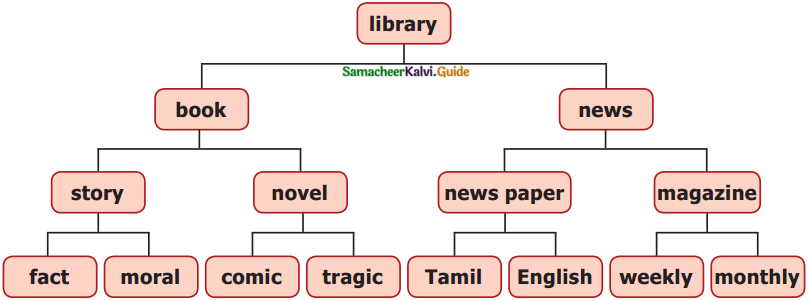
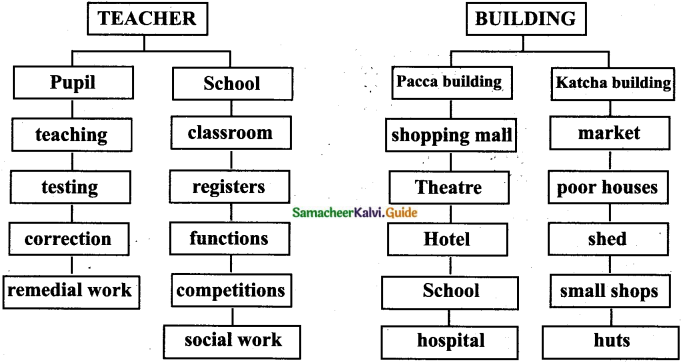
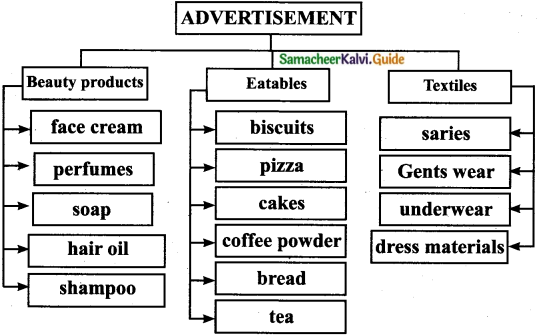
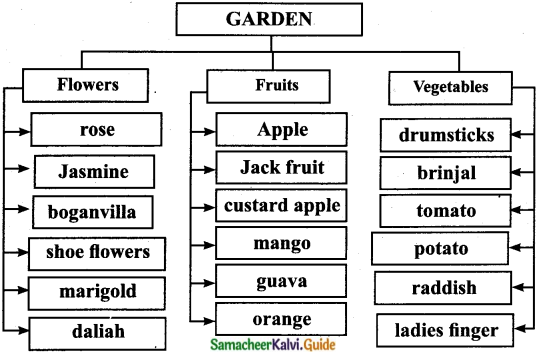
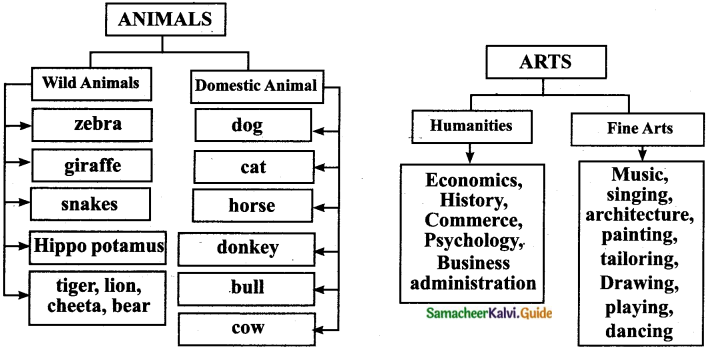
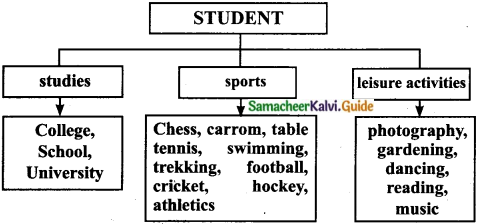
Vocabulary Frame: (Text Book Page No. 145)
B. Look at the list of words. Read the instructions and make Vocabulary Frames.

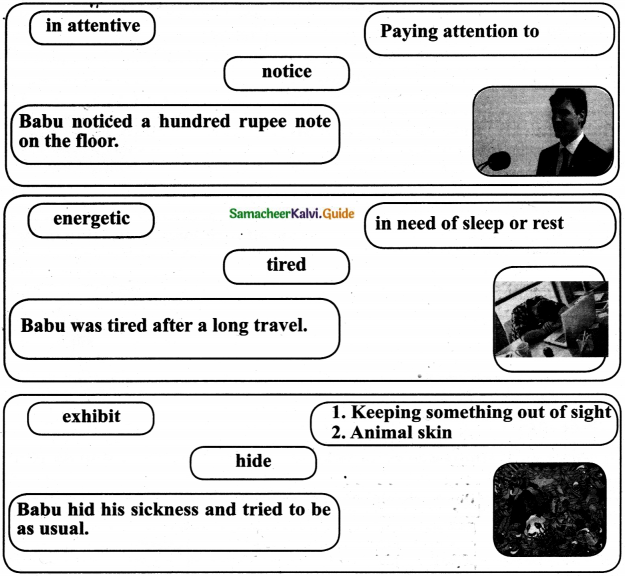
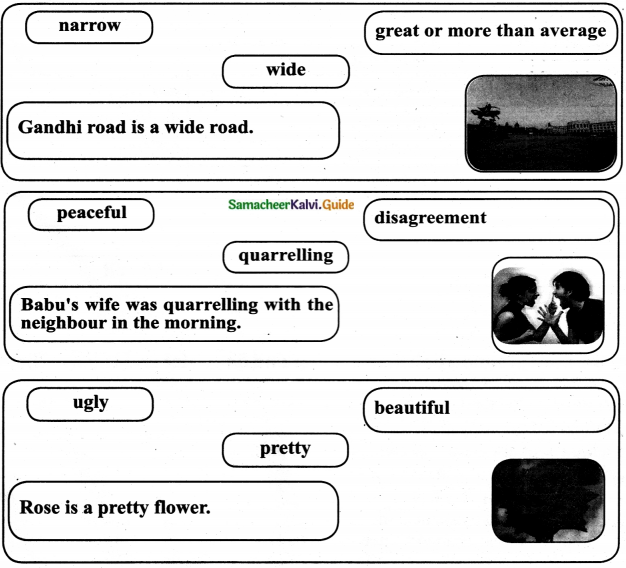
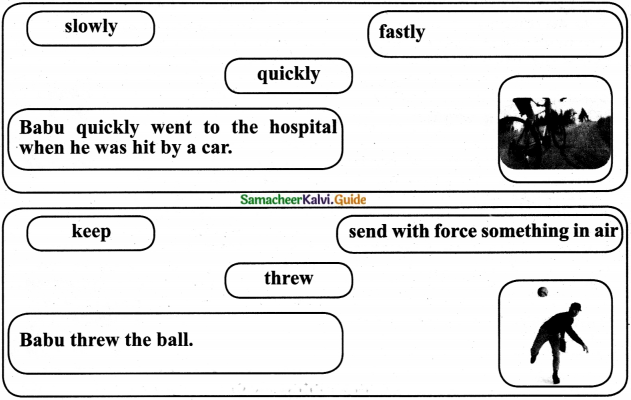
Syllable (Text Book Page No. 145)
C. Fill in the table with monosyllabic, disyllabic and trisyllabic words from the play ‘Jane Eyre’.
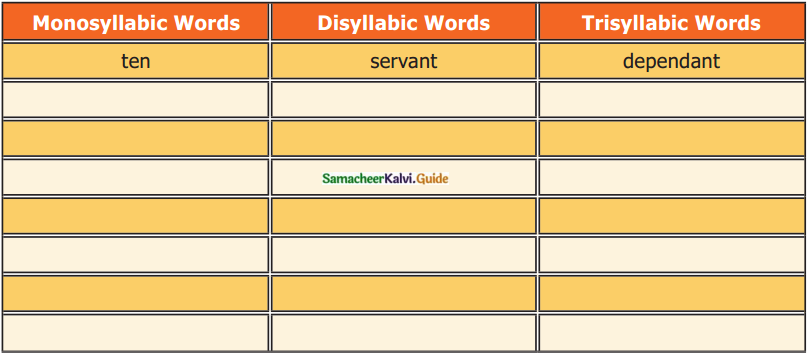
| Monosyllabic Words | Disyllabic Words | Trisyllabic Words |
| ten | servant | dependant |
| No | mo / ney/ | co/llap/ses |
| red | fa/ther | hes/si/tate |
| show | child/ren | mo/ni/tors |
| me | win/dow | pro /ba/bly |
| goes | mat/ter | des/pe/rate |
| here | mor/ning | te/di/ous |
| way | bet/ter | en/ter/tain |
| died | sup/per | pre/dis/posed |
| want | ra/ther | cha/ri/ty |
| read | gi/ven | dif/fi/cult |
Listening (Text Book Page No. 146)
D. Listen to the conversation between a father and daughter and say whether following statements are true or false.
1. Dad hasn’t been to this fishing spot since last year.
Answer:
True
2. Dad used to go fishing with his father.
Answer:
False
![]()
3. Dad has talked a lot about this fishing spot in the past.
Answer:
True
4. The daughter also loves to fish.
Answer:
False
5. Dad says his daughter MUST fish.
Answer:
False
6. The daughter is going to cook the fish.
Answer:
True
7. Dad’s fishing place hasn’t changed since he was a boy.
Answer:
False
Speaking
E. Imagine that below are some of the paintings of Jane Eyre. Discuss your partner and describe the paintings.
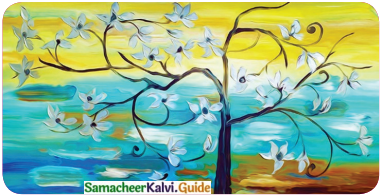
Painting (1) Tree:
In the first painting we see a single tree which has produced many beautiful flowers. Trees protect the Earth from pollution. Trees bring forth rain we need a variety of eco-system with diverse flora and fauna.
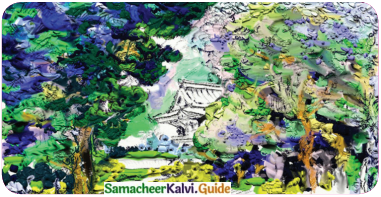
Painting (2) Snowy mountain:
The second painting of Jane Eyre shows the picture of snow capped mountains. The picture snows the scenic splendour of magical valley. This place appears to be a Paradise on Earth. While looking at the painting we can sense the pristine snowy landscape and the breath taking beauty of it. The place in the painting appears to be a blessed region with fresh air.
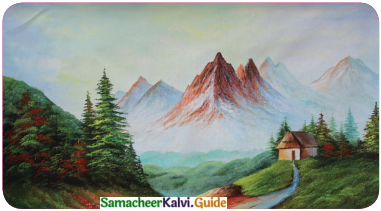
Painting (3) Land slide:
A collapse of a mass of earth or rock from a mountain or cliff is called land slide. Land slides are a type of mass wasting which denotes any down slope movement of soil and rock under the direct influence of gravity. Landslides are caused by rain, earthquakes, volcanoes or other factors that make the slope unstable.
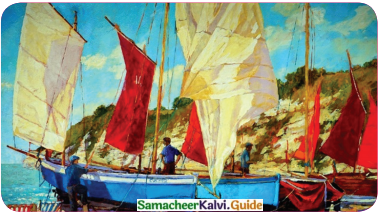
Painting (4) Yacht in the sea:
Yacht in the painting is of old type. Yachts may be of different types. There are fishing boats, small boats, sailing yacht etc. A sailing ship uses sails mounted on one or more masts to harness the power of wind and propel the vessel.
Role Play
F. Put students into groups of three and let them act as Jane.
Student A: You are Jane. You live with the Reeds. Tell the other students about your life there.
My Parents died when I was very young. I do not even remember them. Mr. Reed has been my uncle. He liked me. He took me in his house. When he died he got a promise from Mrs. Reed to take care of me. The children of Mrs. Reed tortured me beyond the limit. They scolded me and hit me badly. Though I did nothing wrong Mrs. Reed abused me and locked me in red room. There I got frightened. I thought my uncle Mr. Reed visited me in the red room. I screamed and fainted. I became ill. The doctor told that I had been suffering with fever. Only Bessie, the servant maid showed me some concern and love. No one else. My childhood at the house of Mrs. Reed was a real hell and nothing else.
Student B: You are Jane. You have been at Lowood School for a few months. Tell the other students about your life there.
When I went to the school at Lowood I was not aware that it was charity school for orphans. I went there and met Miss. Temple and Miss. Miller, teachers of the school. Miss. Temple was really kind to me. I befriended Helen Bums. Unfortunately she got infection and died. Out of eighty students forty five of them fell ill at the same time. Half starvation and severe cold made the students ill. After this incident fell the school improved. I was there six years as a student and two years as a teacher.
![]()
Student C: You are Jane. You are eighteen. You are going to work at Thornfield Hall as a teacher. Tell the other students about your hopes for your life.
After my laborious years in the school at Lowood, I became half desperate. I wanted liberty. So I advertised in The ‘Herald’ newspaper for situations. A week later I received a letter from Mrs.
Fairfax Thomfield. I left Lowood and went to Thomfield. Mrs. Fairfax was kind to me. I was anxious to see Miss. Fairfax. But Mrs. Fairfax said that she had no family. The house belonged to Mr. Rochester. His ward was Adela. Adela would be my pupil in future. Adela came running in the lawn in the morning. I saw her and talked to her. She looked beautiful. She said she liked dancing, singing and drawing. I started a new life as a governess in Thomfield.
After this, decide who is the unhappiest of the three ‘Janes’.
[Jane in the house of Mrs. Reed was the unhappiest moments of her life. Because she was too young and had no support to defend herself from violence.]
Reading (Text Book Page No. 147)
G. Read the story and fill in the grid by ticking each character’s qualities.
Discuss in pairs to rate the characteristic and give marks from 1 to 10 depending on the grade of each quality.
Justify your views in one or two sentences.
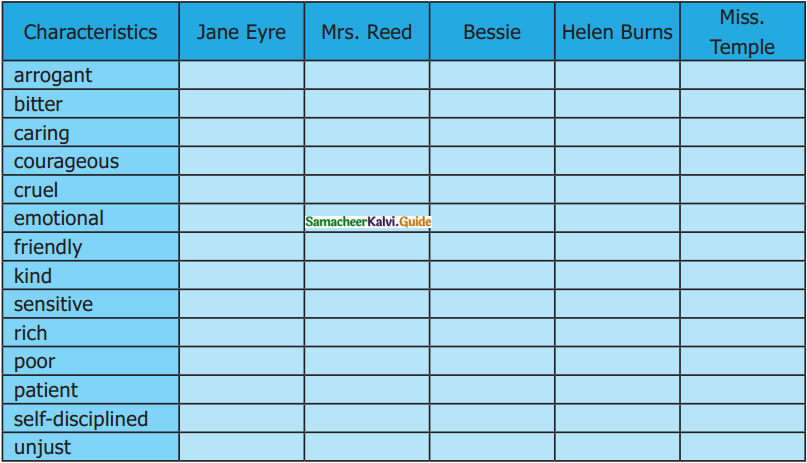
Answer:
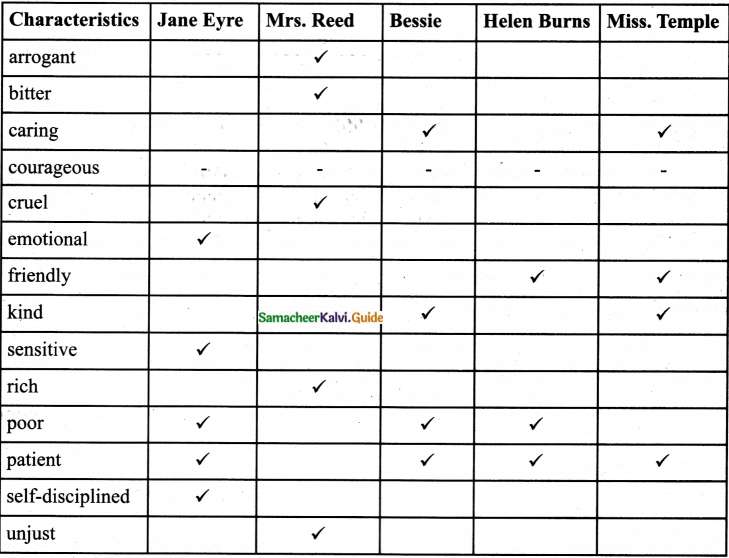
Writing (Text Book Page No. 148)
H. Arrange the jumbled sentences and write a paragraph. Use appropriate conjunctions.
Jane Eyre had been an orphan. Mr. Reed, Jane’s uncle liked her but he died. Eventually. Jane was living with her aunt, Mrs. Reed. Mrs. Reed did not like Jane because Jane was not her, own daughter. Mr. Reed made Mrs. Reed promise to take care of Jane, but instead Mrs. Reed sent Jane away. When Jane was ten years old she was sent to Lowood school. There Jane got graduated. She stayed there as a teacher for two years. Afterwards she left for Thomfield, where she worked as a governess and she was happy there.
I. Read scene I. Discuss with your partner what Mrs. Reed might write about Jane in her letter to the owner of a school. Now complete her letter to Mr. Brockiehurst.
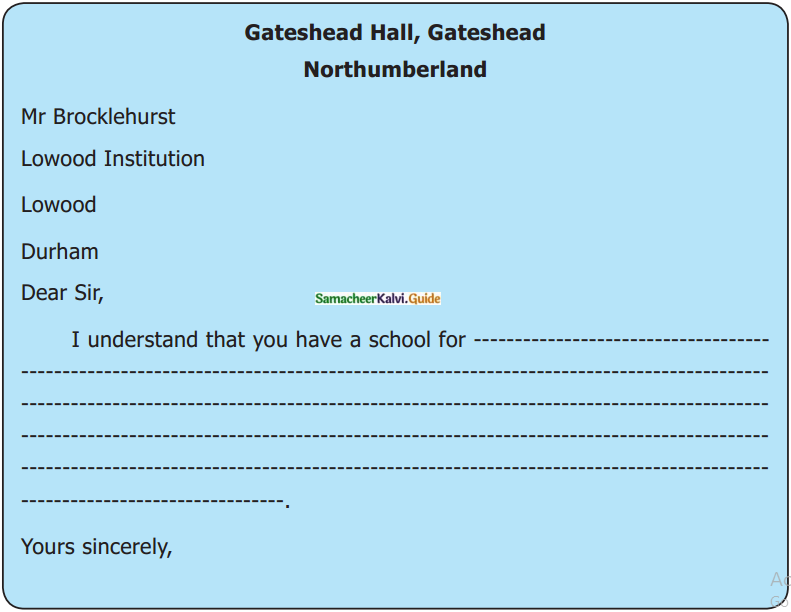
Answer:
|
Gateshead Hall, Gateshead Mr. Brockiehurst I understand that you have a school for charity children at Lowood. Here we have an orphan named Jane Eyre in my custody. Kindly admit her in your school at Lowood. So that she can get education. Kindly help me and also the orphan child. Thanking you, |
Grammar (Text Book Page No. 149)
J. Read the passage. Choose between a little, a lot of, a few, few, fewer, many and much to fill in the gap.
DON’T CALL US, WE’LL CALL YOU!
Two years ago, I moved to a new neighbourhood. There seemed to be very few people in this area without telephones, so I expected to get a new phone quickly. I applied for one as soon as I moved into my new house. ‘We aren’t supplying many new phones in your area’, an engineer told me. ‘A lot of people want new phones at the moment and the company is employing fewer engineers than last year so as to save money. A new phone won’t cost you much money, but it will take little time. We can’t do anything for you before December. ‘You need little patience if you’re waiting for a new phone and you need a few friends whose phones you can use as well. Fortunately, I had both. December came and went, but there was no sign of a phone. I went to the company’s local office to protest. ‘They told me I’d have a phone by December,’ I protested. ‘Which year?’ the assistant asked.
K. Read the Time Line of Harish. Write sentences using the present perfect tense.
Answer:
(for the Time Line see text book page – 149)
- 1971 – Harish has been born in Madurai.
- 1976 – Harish and his family have moved to Chennai.
- 1993 – Harish has finished college and started working for Indian Oil.
- 1996 – Harish has been promoted as a manager at Indian Oil.
- 1997 – Harish has met Amina.
- 2000 – Harish and Amina have got married.
- 2001 – They have got a child.
L. Read the following passage and fill in the blanks with the correct form of the verb. (Text Book Page No. 150)
Where had I gone? What had I done?
What had I seen?
I had never seen (see) such beautiful sights before I visited Paris in 2012. I saved (save) money for five years before I booked my trip to Paris. I was very excited! Before my trip to Paris, I had never been (be) out of India.
When I went to Paris, I spent many days touring the city. The city was big. Sometimes I got lost and asked for directions. I asked for directions in French. That was easy because I had been studying (study) French for two years before I visited Paris.
By the time I left Paris, I toured (tour) many beautiful places. The Eiffel Tower, the Notre Dame Cathedral, and the Luxembourg Gardens were just a few of the places I saw. Before I visited Paris, I had only seen (see) those places on television. –
M. Look at the picture and write eight sentences using prepositions.
Where is the rabbit?
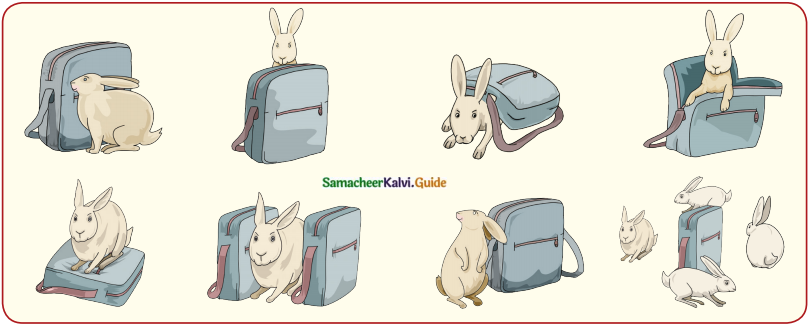
- The rabbit is behind the bag.
- The rabbit is in front of the bag.
- The rabbit is under the bag.
- The rabbit is in the bag.
- The rabbit is on the bag.
- The rabbit is in between the bags.
- The rabbit is beside the bag.
- The rabbit is around the bag.
Comparative and Superlative Survey
N. Answer the questions below. Write your answers in the second column of the table. (Text Book Page No. 151)
a. How old are you?
Answer:
12 years
b. How tall are you?
Answer:
5 feet
![]()
c. What bicycle do you have?
Answer:
Ladybird
d. How many languages do you speak?
Answer:
2 languages
e. At what time do you usually wake up?
Answer:
6 Am
f. How far is your home from school?
Answer:
½ km
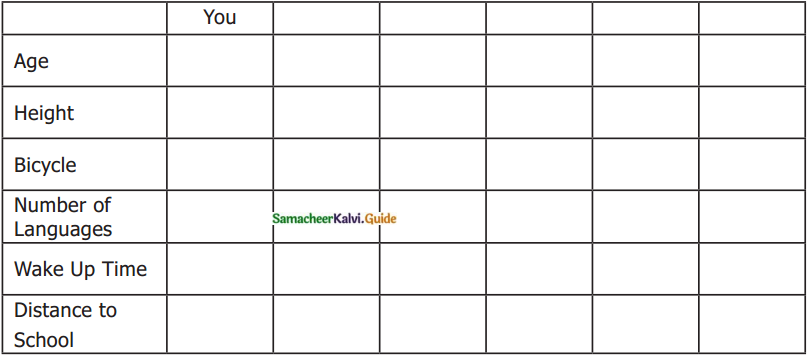
Answer:

O. Work in groups of six. Write the other students’ names at the top of the table. Interview each student using the above questions and complete the table with their answers.
When you have all the answers, use the results to write three comparative and three superlative sentences about the students in your group.
Examples:
I am the oldest in my group.
My bicycle is more colourful than Jane’s bicycle.
- I am older than Babu in my class.
- Leela is taller than Kala.
- Leela’s bicycle is more expensive than my bicycle.
- Leela speaks the highest number of languages in my class.
- Babu is the one who wakes up at the earliest hour in the morning.
- Babu’s house is the nearest house to my school.
Passive Voice (Text Book Page No. 152)
P. Read the following article about the amazing similarities between the assassination of John F. Kennedy and Abraham Lincoln; then underline the passive forms.
Abraham Lincoln was elected to Congress in 1846. Voters elected John. F. Kennedy to Congress in 1946.
Answer:
was elected
![]()
Lincoln was elected president in 1860. Voters elected Kennedy president in 1960.
Answer:
was elected
Both men were particularly concerned with civil rights.
Answer:
were cocerned
Both wives lost their children while living in the White House.
Answer:
lost
Lincoln was shot on a Friday. Someone shot Kennedy on a Friday.
Answer:
was shot
Lincoln was shot in the head. The gunman shot Kennedy in the head.
Answer:
was shot
Lincoln’s secretary was called Kennedy. Kennedy’s secretary was called Lincoln.
Answer:
was called, was called
Lincoln was assassinated by a Southerner. A Southerner assassinated Kennedy.
Answer:
was assassinated
Lincoln was succeeded by a Southerner named Johnson. A Southerner named Johnson succeeded Kennedy.
Answer:
was succeeded
Andrew Johnson, who succeeded Lincoln, was born in 1808.
Answer:
was born
Lyndon Johnson, who succeeded Kennedy, was born in 1908.
Answer:
was born
John Wilkes Booth, who assassinated Lincoln, was born in 1839. Lee Harvey Oswald, who assassinated Kennedy, was born in 1939.
Answer:
was born
Both assassins were known by their three names and both names are composed of fifteen letters.
Answer:
were known, are composed
Lincoln was shot at a theatre named “Ford”. The gunman shot Kennedy in a car called a “Lincoln that the company Ford made.
Answer:
was shot
Booth ran from the theatre and was caught in a warehouse. Oswald ran from a warehouse and the police caught him in a theatre.
Answer:
was caught
![]()
Booth was assassinated before his trial. Someone assassinated Oswald before his trial.
Answer:
was assassinated
Q. Reported Questions (Text Book Page No. 153)
1. Jane told Bessie that she would hide herself in the library with Uncle Reed’s book.
Answer:
Why did Jane tell Bessie that she would hide herself in the library with uncle Reed’s book?
2. John ordered Jane to come there when he called her.
Answer:
What did John order Jane?
3. Eliza asked Jane what she was doing then.
Answer:
What did Eliza ask Jane?
4. Mrs. Reed told Bessie to take her away to the red room and lock her in there.
Answer:
What did Mrs. Reed tell Bessie?
5. Miss. Temple asked Jane whether she could read and write.
Answer:
What did Miss. Temple ask Jane?
6. Miss. Miller asked Miss. Temple where she should put Jane.
Answer:
What did Miss. Miller ask Miss. Temple?
7. Jane asked Helen why they called it an institution.
Answer:
Why did they call the school an institution?
8. Helen asked Jane why she had come there.
Answer:
Why did you come here?
9. Jane asked Mrs. Fairfax whether she would have the pleasure of seeing Miss. Fairfax that night.
Answer:
Would I have the pleasure of seeing Miss. Fairfax this night?
![]()
10. Miss. Adela told Jane that she could sing and dance also.
Answer:
Can you sing and dance?
Project
S. Look at the story board. Read the captions given under each frame. Fill the bubbles and complete the story board. (Text Book Page No. 154)
Create your own story board for the scene ’At Thornfield’.
Make a power point presentation using the story board.
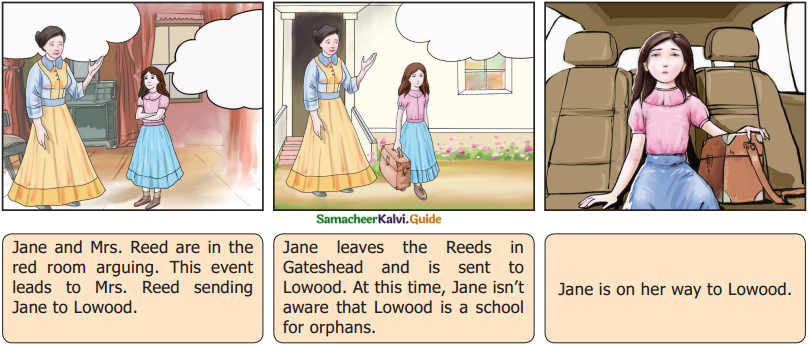
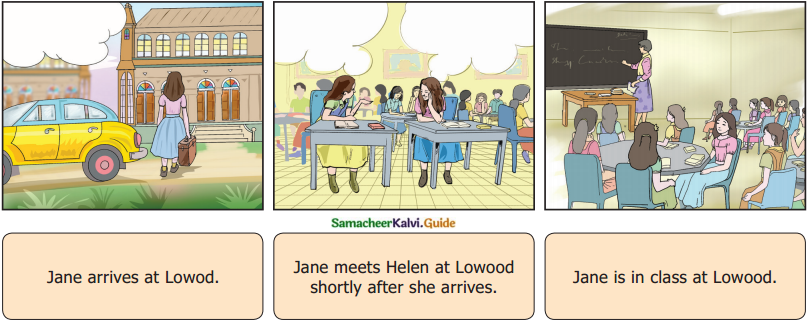 Answer:
Answer:
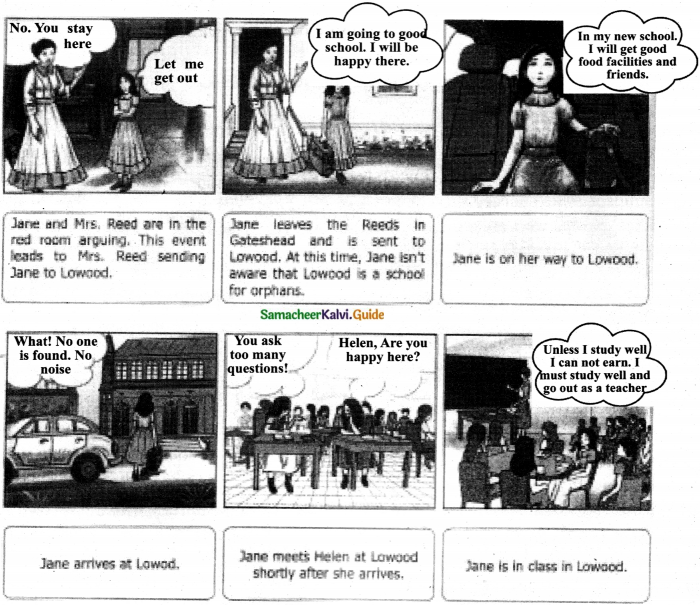
Jane Eyre Summary in English
The story of Jane Eyre tells the hardships of an orphan child who started her life as a governess in a rich family. Though she confronted with difficulties, She kept on her principles. At the end, she got a happy life to live ever after.
Jane Eyre Summary in Tamil
ஜேன் ஐயரின் கதை, அநாதையான ஒரு பெண் குழந்தையின் துயரங்கள் பற்றிக் கூறுகிறது. இந்த அநாதை பெண் ஒரு பணக்கார வீட்டில் குழந்தைகளைப் பார்த்துக் கொள்ளும் ஆயாவாக தன் வாழ்வை ஆரம்பிக்கிறாள். நிறைய துயரங்களைச் சந்திக்கிறாள். இருப்பினும் தன் நெறிமுறைகளை காத்துக் கொள்கிறாள். இறுதியில் அவளுக்கு மகிழ்ச்சியான வாழ்வு கிட்டுகிறது.
Jane Eyre About the Author in English
Jane Eyre is a novel written by an English novelist, poet, Charlotte Bronte. Her^ sisters Emily and Anne also were writers. Many of her novels including Jane Eyre had been converted to movies. The story of Jane Eyre came as a Tamil film named ‘Santhi Nilayam’.
Jane Eyre About the Author in Tamil
ஜேன் ஐயர் என்ற நாவல் ஆங்கில நாவல் ஆசிரியர், கவிஞர் சார்லட் பிரான்டியால் எழுதப்பட்டது. அவரது சகோதரிகள் எமிலி, ஆனி ஆகியோரும் எழுத்தாளர்கள் ஆவர். சார்லட்டின் நிறைய நாவல்கள் திரைப்படங்களாய் வெளிவந்துள்ளன. ஜேன் ஐயர், கதை, தமிழ் திரைப்படமாக சாந்தி நிலையம் என்ற பெயரில் வந்துள்ளது.